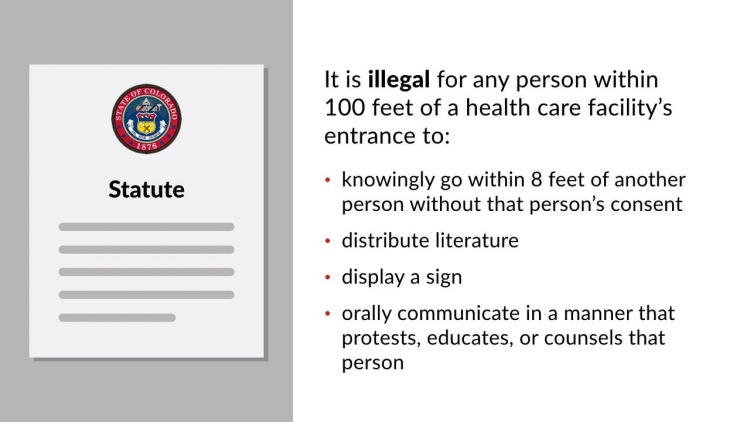Hill v. Colorado
United States Supreme Court
530 U.S. 703, 120 S. Ct. 2480, 147 L. Ed. 2D 597 (2000)
- Written by Megan Petersen, JD
Facts
A 1993 Colorado statute regulated speech-related conduct within 100 feet of the entrance to any healthcare facility. The statute made it unlawful for any person to knowingly approach another person within eight feet, without that person’s consent, “for the purpose of passing a leaflet or handbill to, displaying a sign to, or engaging in oral protest, education, or counseling with such other person.” The ordinance did not place any restrictions on the content of the message. Leila Hill (plaintiff) was a sidewalk counselor who offered information about abortion alternatives to women entering healthcare facilities for abortion services. She and other counselors brought suit against the State of Colorado (defendant) in state court seeking to enjoin enforcement of the statute on the grounds that it violated the First Amendment. The trial court held that the statute was a reasonable, content-neutral time, place, and manner regulation. The Colorado Supreme Court affirmed, and the United States Supreme Court granted certiorari.
Rule of Law
Issue
Holding and Reasoning (Stevens, J.)
Dissent (Kennedy, J.)
Dissent (Scalia, J.)
What to do next…
Here's why 907,000 law students have relied on our case briefs:
- Written by law professors and practitioners, not other law students. 47,100 briefs, keyed to 996 casebooks. Top-notch customer support.
- The right amount of information, includes the facts, issues, rule of law, holding and reasoning, and any concurrences and dissents.
- Access in your classes, works on your mobile and tablet. Massive library of related video lessons and high quality multiple-choice questions.
- Easy to use, uniform format for every case brief. Written in plain English, not in legalese. Our briefs summarize and simplify; they don’t just repeat the court’s language.





